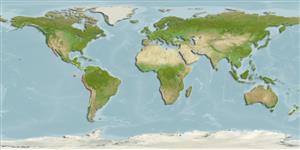>
Eupercaria/misc (Various families in series Eupercaria) >
Labridae (Wrasses) > Bodianinae
Etymology: Bodianus: Bodianus after Bodiano or Pudiano, from the Portuguese pudor, meaning modesty (Jordan & Evermann, 1896); eclancheri: Named for M. L’Eclancher (Ref. 75973).
Eponymy: Charles René Augustin Leclancher (1804–1857) was a French naval surgeon. [...] (Ref. 128868), visit book page.
More on author: Valenciennes.
Environment: milieu / climate zone / depth range / distribution range
Sinh thái học
Biển Cùng sống ở rạn san hô; Mức độ sâu 5 - 46 m (Ref. 5227). Tropical
Southeast Pacific: Ecuador to central Chile. Originating in the Peru-Chile Province, it is found in the cooler waters of the Galapagos Islands.
Bộ gần gũi / Khối lượng (Trọng lượng) / Age
Maturity: Lm ? range ? - ? cm
Max length : 61.0 cm TL con đực/không giới tính; (Ref. 5592); common length : 40.0 cm TL con đực/không giới tính; (Ref. 55763)
Body moderately deep and compressed; head large and pointed; teeth elongate and compressed, resembling incisors; dorsal fin contiguous, with 12 spines; posterior rays of dorsal and anal fins forming filamentous lobes; lower branch of first gill arch with 9 to 10 gill rakers; variable, depending on size and sex; body brown, black, red or orange, but less than 5 percent of the population is entirely black (Ref. 55763).
A sequentially protogynous hermaphrodite. In the Galapagos, the colorful appearance may be due to selective pressures and their increased feeding and decreased reproductive activities may serve to avoid extraordinary predation (Ref. 9227). Adults forage on a wide range of invertebrates and algae (Ref. 28023). Oviparous, distinct pairing during breeding (Ref. 205).
Life cycle and mating behavior
Chín muồi sinh dục | Sự tái sinh sản | Đẻ trứng | Các trứng | Sự sinh sản | Ấu trùng
Pelagic spawner (Ref. 32168). Oviparous, distinct pairing during breeding (Ref. 205). Also Ref. 103751.
Merlen, G., 1988. A field guide to the fishes of Galapagos. Wilmot Books, London, England 60 p. (Ref. 5590)
IUCN Red List Status (Ref. 130435: Version 2024-1)
Threat to humans
Harmless
Human uses
Các nghề cá: không ích lợi (thú vị); Bể nuôi cá: Tính thương mại
Các công cụ
Special reports
Download XML
Các nguồn internet
Estimates based on models
Preferred temperature (Ref.
123201): 16.6 - 24, mean 21.3 °C (based on 16 cells).
Phylogenetic diversity index (Ref.
82804): PD
50 = 0.5000 [Uniqueness, from 0.5 = low to 2.0 = high].
Bayesian length-weight: a=0.01230 (0.00569 - 0.02662), b=3.05 (2.87 - 3.23), in cm total length, based on LWR estimates for this Genus-body shape (Ref.
93245).
Mức dinh dưỡng (Ref.
69278): 2.7 ±0.24 se; based on food items.
Thích nghi nhanh (Ref.
120179): thấp, thời gian nhân đôi của chủng quần tối thiểu là 4.5 - 14 năm (Preliminary K or Fecundity.).
Fishing Vulnerability (Ref.
59153): Moderate vulnerability (44 of 100).
Nutrients (Ref.
124155): Calcium = 36.5 [20.2, 58.5] mg/100g; Iron = 0.533 [0.306, 0.983] mg/100g; Protein = 18.3 [15.4, 20.5] %; Omega3 = 0.114 [0.074, 0.177] g/100g; Selenium = 37.5 [21.7, 65.4] μg/100g; VitaminA = 71.6 [21.4, 255.8] μg/100g; Zinc = 1.41 [1.03, 2.30] mg/100g (wet weight);
